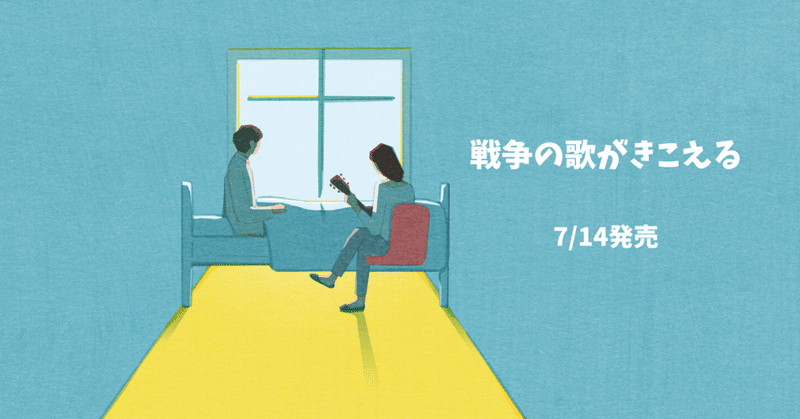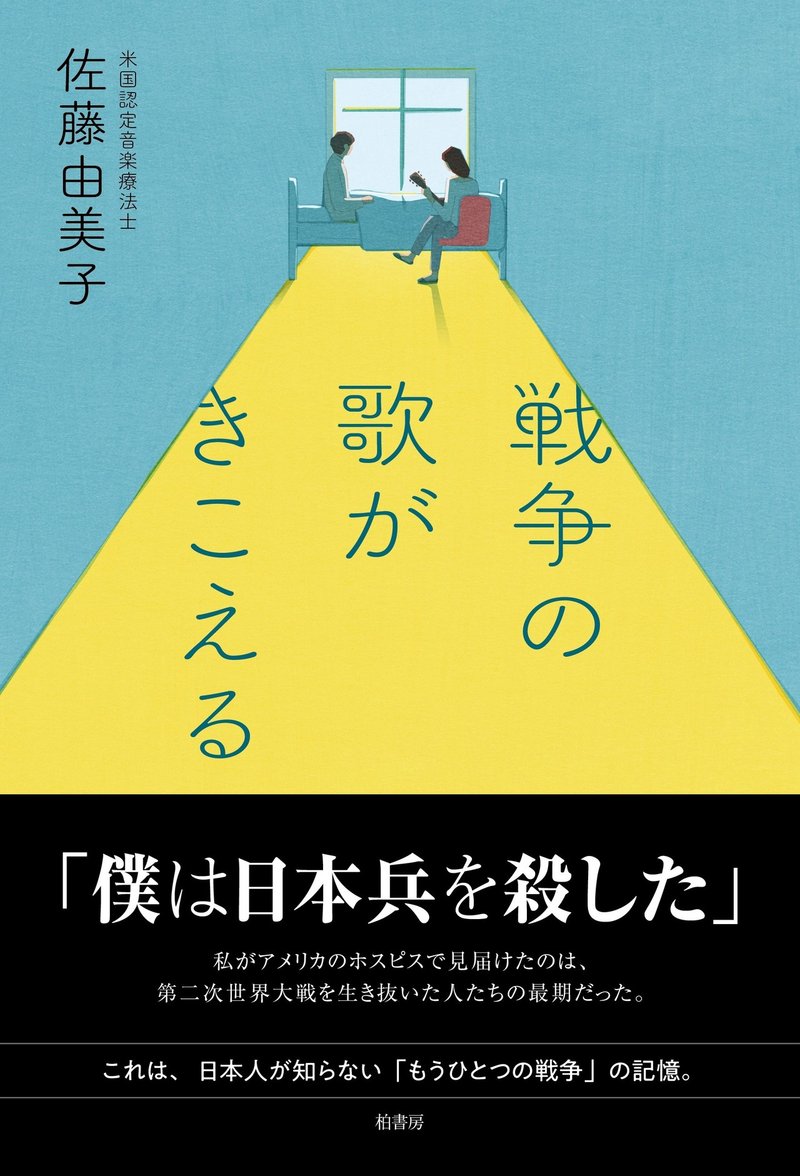
私が『戦争の歌がきこえる』を書いた理由(Why I Wrote “Song of War”)|佐藤由美子
《 English Version Below 》
私が『戦争の歌がきこえる』を書いた理由
2002年、アメリカのホスピスで音楽療法士として仕事を始めた当初、私が出会った患者さんやご家族の多くは第二次世界大戦を経験した人たちでした。戦争で愛する人を失った人や、戦争で心や体に深い傷を負い、それを最期まで抱えて生きてきた人たちがいました。
音楽療法士(ミュージックセラピスト)という仕事は馴染みのない人も多いかと思います。音楽療法は様々なニーズを持った人を対象に提供される療法ですが、終末期の患者さんやご家族の場合は、音楽療法を通じての精神的サポート、社会的サポート、身体的サポートなどが中心となります。音楽を聴く、一緒に唄う、楽器をつかった即興、音楽回想法など、様々な介入方法があります。
私はオハイオ州シンシナティ市にあるホスピスで、音楽療法士として働きました。この町はドイツ系移民が多く、アジア系はとても少ないところです。実際、10年間住んでいて、日本人と知り合ったのは一度しかありません。そういう土地柄なので、多くの患者さんは私が日本人であることに驚きました。特に第二次世界大戦の退役軍人にとっては、ホスピスで日本人の音楽療法士に出会うとは、想像もしていなかったと思います。
彼らは私のネームタグを見て「日本人」だと気づき、“Are you Japanese?! (日本人なの?!)”と信じられない様子でした。そして、彼らの人生において最も印象深く、最もつらかったであろう出来事を思い出し、私に打ち明けたのです。
「僕は日本兵を殺した!」
「親友が日本兵に殺された。でも僕は、日本を愛している」
「原爆開発に関わったことを、誇りには思っていない」
「僕はドイツ兵として戦った。当時僕たちは味方だった。今、きみに会えて嬉しい」
彼らは、まるで昨日起こった出来事を話すかのように、当時の記憶を語ったのです。それは、日本で生まれ育った私が聞いてきた戦争の話とはかなり異なるものでしたし、アメリカが国家として語り継いできた退役軍人の「神話」よりもはるかに複雑でした。
私は彼らから多くのことを学びましたが、何より、第二次世界大戦について異なる視点から考える機会ができたと思います。この戦争は「世界大戦」でした。日本対アメリカでもなければ、アメリカ対ドイツでもない。国境を越えて人々の記憶を辿ることが大切なのだと気づかされました。それが今回、彼らのストーリーを『戦争の歌がきこえる』(柏書房)に紡いだ理由です。

私はまず英語で書き、それを日本語に訳すというスタイルをとるため、執筆中は、日本とアメリカの言語的・文化的な違いを何度も痛感しました。そのたびにつまずいたポイントを掘り下げて考えましたし、直訳では伝わらない観念がいくつもあることに気づきました。例えば、「歴史認識」は日本語独特で英語には該当する言葉はありません。また、「責任」や「謝罪」の観念も日米ではかなり異なります。これらの違いを知ることは、記憶や歴史を理解する上で欠かせないことだと思いましたので、本の最後に「補遺」としてまとめました。
今年で戦後75年。多くの戦争経験者は亡くなっています。戦後生まれの私たちにとって、先の大戦は遠く昔のことに感じるかもしれません。私も以前はそう思っていました。でも今、世界中で勢力を伸ばしているナショナリズムの流れを見ていると、このような戦争はまた起こる可能性があると思います。私は現在アメリカに住んでいますが、トランプ大統領の「アメリカ・ファースト」に見られるように、ナショナリズムの愛国心の裏側には、他者への恐怖心や不信感が見え隠れしているのです。このような潮の流れは、アメリカだけではなく世界中を巻き込みつつあります。だからこそ、今、戦争経験者の記憶に耳を傾け、忘れられてきた(あるいは意図的に無視されてきた)記憶にも向き合う必要があると思います。
本書で紹介した人たちはもう、この世にはいません。私が受け取った言葉を、ひとりでも多くの日本人に届けられたらと願っています。
Why I Wrote “Song of War”
When I began working at a hospice in the U.S as a music therapist in 2002, many of my patients and families were from the generation that fought in WWII. Some had lost their loved ones, while others had been scarred for life physically and/or mentally.
I was working in Cincinnati, Ohio where there were few Asian people, let alone Japanese. In fact, during the 10 years I lived and worked there I only met one Japanese person. So you can imagine how shocking it must have been for some of my patients to learn I was from Japan, especially WWII veterans. Many people who experienced WWII didn’t talk about their experiences after the war (this is true in Japan also), but upon meeting me they were reminded of the most memorable and perhaps the worst period of their lives.
“I killed Japanese soldiers....!”
“My best friend was killed by the Japanese.”
“I was involved in the Manhattan project, but I didn’t know what it was for.”
“I fought as German! We were allies. I’m so glad to meet you now...”
They cried as if these events had taken place yesterday and proceeded to tell me their past. Their stories were far more complex than the myths of WWII I’d often heard in the U.S or growing up in Japan.
In 2013 I returned to Japan and began working at a hospice in the northern prefecture of Aomori. There I encountered patients who also lived through WWII. Some grew up in Manchuria or Sakhalin island and escaped in the final days of the war. Others remembered the bombing of Aomori City. Their stories and sentiment reminded me of what I heard from my American patients. Directly or indirectly, they were all telling me the same thing: Do not to forget what happened. Learn from the past.
Writing this book was my attempt to do just that. I wanted to revisit their stories and try to understand their experiences. I also wanted to find a clue that connects the past and the present.
In the process of writing I learned that due to cultural differences between Japan and the U.S., many concepts had to be examined and explained. For instance, words such as “responsibility/fault” or “apology” mean different things when translated into Japanese. I felt it was important to explain such differences in order to understand our memories and history, so at the end of the book I added a section to discuss these topics.
I hope that this book will allow readers to look at WWII from different perspectives in the same way that I experienced through meeting the people who experienced war. Listening to those who are different from us in terms of nationality, ethnicity, religion, generation can be challenging. But I believe it ultimately helps us understand ourselves better.
〈The book is in Japanese, but my hope is that one day it’ll be translated into English〉
佐藤由美子(Yumiko Sato)
ホスピス緩和ケアの音楽療法を専門とする米国認定音楽療法士。バージニア州立ラッドフォード大学大学院音楽科を卒業後、オハイオ州のホスピスで10年間音楽療法を実践。2013 年に帰国し、国内の緩和ケア病棟や在宅医療の現場で音楽療法を実践。その様子は、テレビ朝日「テレメンタリー」や朝日新聞「ひと欄」で報道される。2017年にふたたび渡米し、現地で執筆活動などを行なう。著書に『ラスト・ソング――人生の最期に聴く音楽』、『死に逝く人は何を想うのか――遺される家族にできること』(ともにポプラ社)がある。
Twitter: @YumikoSatoMTBC
HP: https://yumikosato.com
